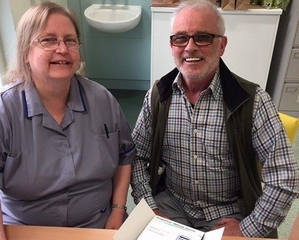TWO hundred patients within the North Manchester area are to be given the opportunity to sign-up to a new research study being carried out in the anticoagulant department at North Manchester General Hospital.
The pilot study which has been commissioned and funded by Manchester Health and Care Commissioning, which is a partnership arrangement between Manchester City Council and Manchester Clinical Commissioning Group, is seeking patients who have atrial fibrillation (irregular heartbeat) who take Warfarin to self-test their blood results at home to check that their dosage is correct.
Warfarin is the main oral anticoagulant used in the UK and is a medicine that stops blood from clotting. Anticoagulant medicines are often prescribed for people who have had a condition caused by a blood clot such as a stroke, heart attack, deep vein thrombosis or pulmonary embolism (blood clot in the lungs). It can also be prescribed for people at an increased risk of developing harmful blood clots including those with a replacement or mechanical heart value, an irregular heart rhythm or a blood clotting disorder.
The aim of warfarin therapy is to decrease the blood’s tendency to clot, but not stop it clotting completely. This means that the dose of warfarin that patients take must be carefully monitored, and adjusted if necessary.
Patients traditionally have regular blood tests at their GP surgery or the anticoagulant clinic at the hospital. The international normalised ratio (INR) is a measure of how long it takes the blood to clot – the longer it takes, the higher the INR. The INR is used to determine the dose of warfarin needed to take.
The study will allow patients to be taught by an anticoagulant nurse specialist how to self-test their INR blood result at home. They will use a meter to get the result and then report via an app or an automatic telephone service to inform the anticoagulant team of the blood result.
Staff at North Manchester General Hospital will then use the same method to send the warfarin dose needed back to the patient and inform them when they need to repeat the test.
Betty Brough, Pennine Acute Trust lead anticoagulant nurse specialist, said: “The new system gives patients the freedom from attending a clinic appointment on average every four weeks and the ability to test their INR at their convenience.
“It is proving very popular and within the next six months we hope to have enrolled 200 patients onto the scheme. The overall outcomes will hopefully give more flexibility to the patient and show that they have better time in therapeutic range to ensure that their warfarin therapy is effective and therefore reduce their chance of having a stroke.
”The anticoagulant department at North Manchester General Hospital will of course still remain the patients’ first port of call if they have any warfarin related problems and if they need any help or advice.”
Patient Harold Simpson from Newton Heath has already signed up onto the research study. Harold has been attending the anticoagulant clinic every two to four weeks since 2011. He said: “Self-testing is fantastic. It has freed me up from attending so many clinic appointments and it works for me.”







